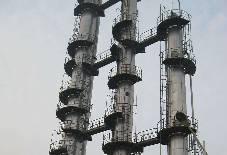As a Methylal Distillation Plant, share with you.
The distillation tower is an indispensable item for distilling a liquid
mixture to divide the mixture into its constituent parts or fractions according
to the difference in volatility. Fractionator is used for small-scale laboratory
distillation and large-scale industrial distillation.
Type of distillation tower
There are many types of distillation columns, each designed to perform a
specific type of separation, and each design differs in complexity.
Batch column
In batch operation, the feed to the column is introduced in batches. That is,
the column is charged with "batch material", and then the distillation process
is carried out. When the required tasks are completed, the next batch of feed
will be introduced.
Continuous column
In contrast, continuous columns process a continuous feed stream. Unless
there is a problem with the chromatographic column or the surrounding processing
unit, there will be no interruption. They can handle high throughput and are the
most common of the two types. We will only focus on this type of column.

Distillation Tower
Types of continuous columns
Continuous columns can be further classified according to the following:
The nature of the feed they are processing
Binary column-the feed contains only two components
Multi-component column-the feed contains more than two components
The number of product streams they have
Multi-product column-this column has more than two product streams
Excess feed is used where it will leave during separation
Extractive distillation-excess feed appears in the bottom product stream
Azeotropic distillation-excess feed appears in the top product stream
Type inside the column
Tray tower-use various designs of trays to contain liquids, so as to make
better contact between vapor and liquid, so as to achieve better separation
Packed column-use "packed" instead of trays to enhance the contact between
vapor and liquid
The main composition of the distillation tower
The distillation tower consists of several components, each of which can be
used to transfer heat or enhance the transfer of materials.
A typical distillation contains several main components:
Vertical housing for separating liquid components
Internal components of the chromatographic column, such as trays/trays and/or
packings, to enhance component separation
Reboiler to provide necessary vaporization for the distillation process
The condenser cools and condenses the vapor leaving the top of the tower
The reflux drum is used to retain the condensed vapor from the top of the
tower so that the liquid (reflux) can be recycled back to the tower
The vertical shell contains the inside of the tower and forms the
distillation tower together with the condenser and the reboiler. Typical basic
operations and terminology for a single feed and two product streams
The liquid mixture to be treated is called the feed, and it is usually
introduced into a tray called the feed tray at a certain position near the
middle of the column. The feed tray divides the column into a top (concentration
or rectification) part and a bottom (stripping) part. The feed flows down the
tower and is collected at the bottom of the reboiler.
Heat is provided to the reboiler to generate steam. The input heat source can
be any suitable fluid, although in most chemical plants it is usually steam. In
a refinery, the heating source can be the output stream of other towers. The
steam produced in the reboiler is reintroduced into the device at the bottom of
the tower. The liquid removed from the reboiler is called the bottom product or
simply the bottom.
The vapor moves up the chromatographic column and is cooled by the condenser
as it leaves the top of the device. The condensed liquid is stored in a storage
container called a reflux drum. Some of these liquids are recycled back to the
top of the tower, which is called reflux. The condensate removed from the system
is called distillate or overhead product.
Our company also has Distillation Tower on sale, welcome to contact us.














